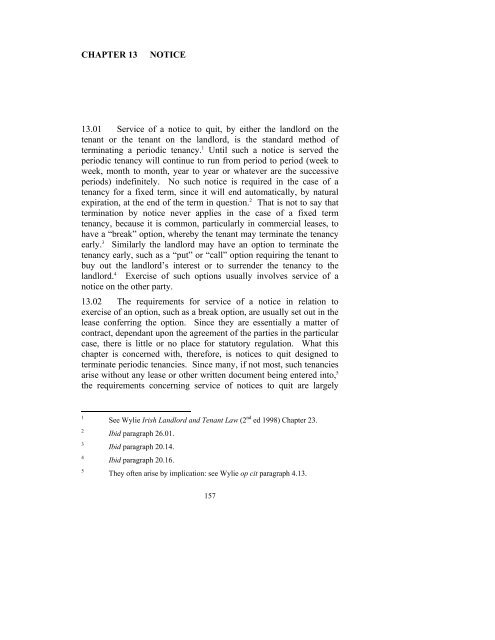Consultation Paper on the General Law of the Landlord and Tenant
Consultation Paper on the General Law of the Landlord and Tenant
Consultation Paper on the General Law of the Landlord and Tenant
You also want an ePaper? Increase the reach of your titles
YUMPU automatically turns print PDFs into web optimized ePapers that Google loves.
CHAPTER 13NOTICE13.01 Service <strong>of</strong> a notice to quit, by ei<strong>the</strong>r <strong>the</strong> l<strong>and</strong>lord <strong>on</strong> <strong>the</strong>tenant or <strong>the</strong> tenant <strong>on</strong> <strong>the</strong> l<strong>and</strong>lord, is <strong>the</strong> st<strong>and</strong>ard method <strong>of</strong>terminating a periodic tenancy. 1 Until such a notice is served <strong>the</strong>periodic tenancy will c<strong>on</strong>tinue to run from period to period (week toweek, m<strong>on</strong>th to m<strong>on</strong>th, year to year or whatever are <strong>the</strong> successiveperiods) indefinitely. No such notice is required in <strong>the</strong> case <strong>of</strong> atenancy for a fixed term, since it will end automatically, by naturalexpirati<strong>on</strong>, at <strong>the</strong> end <strong>of</strong> <strong>the</strong> term in questi<strong>on</strong>. 2 That is not to say thatterminati<strong>on</strong> by notice never applies in <strong>the</strong> case <strong>of</strong> a fixed termtenancy, because it is comm<strong>on</strong>, particularly in commercial leases, tohave a “break” opti<strong>on</strong>, whereby <strong>the</strong> tenant may terminate <strong>the</strong> tenancyearly. 3 Similarly <strong>the</strong> l<strong>and</strong>lord may have an opti<strong>on</strong> to terminate <strong>the</strong>tenancy early, such as a “put” or “call” opti<strong>on</strong> requiring <strong>the</strong> tenant tobuy out <strong>the</strong> l<strong>and</strong>lord’s interest or to surrender <strong>the</strong> tenancy to <strong>the</strong>l<strong>and</strong>lord. 4 Exercise <strong>of</strong> such opti<strong>on</strong>s usually involves service <strong>of</strong> anotice <strong>on</strong> <strong>the</strong> o<strong>the</strong>r party.13.02 The requirements for service <strong>of</strong> a notice in relati<strong>on</strong> toexercise <strong>of</strong> an opti<strong>on</strong>, such as a break opti<strong>on</strong>, are usually set out in <strong>the</strong>lease c<strong>on</strong>ferring <strong>the</strong> opti<strong>on</strong>. Since <strong>the</strong>y are essentially a matter <strong>of</strong>c<strong>on</strong>tract, dependant up<strong>on</strong> <strong>the</strong> agreement <strong>of</strong> <strong>the</strong> parties in <strong>the</strong> particularcase, <strong>the</strong>re is little or no place for statutory regulati<strong>on</strong>. What thischapter is c<strong>on</strong>cerned with, <strong>the</strong>refore, is notices to quit designed toterminate periodic tenancies. Since many, if not most, such tenanciesarise without any lease or o<strong>the</strong>r written document being entered into, 5<strong>the</strong> requirements c<strong>on</strong>cerning service <strong>of</strong> notices to quit are largely12345See Wylie Irish <strong>L<strong>and</strong>lord</strong> <strong>and</strong> <strong>Tenant</strong> <strong>Law</strong> (2 nd ed 1998) Chapter 23.Ibid paragraph 26.01.Ibid paragraph 20.14.Ibid paragraph 20.16.They <strong>of</strong>ten arise by implicati<strong>on</strong>: see Wylie op cit paragraph 4.13.157
















